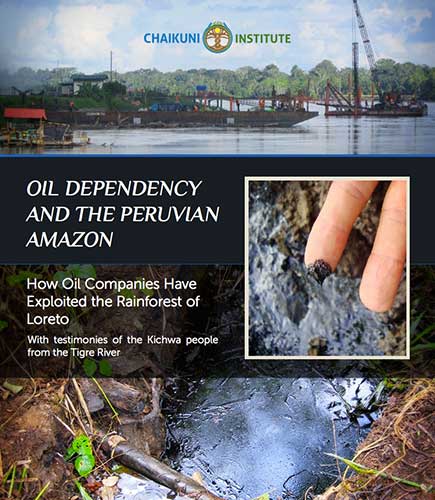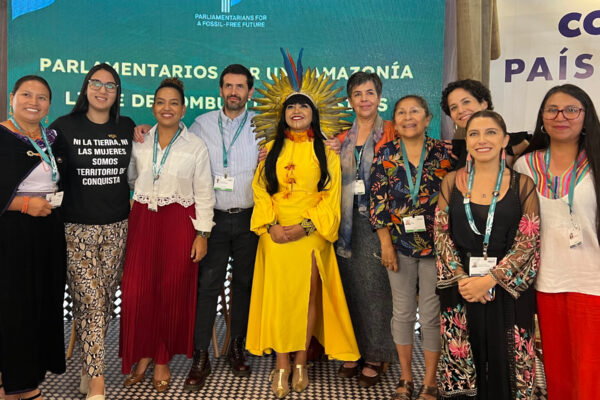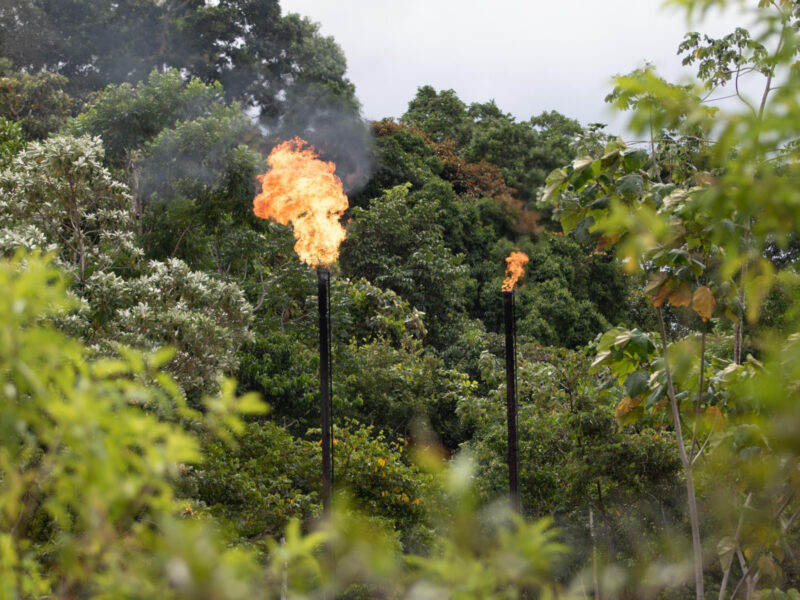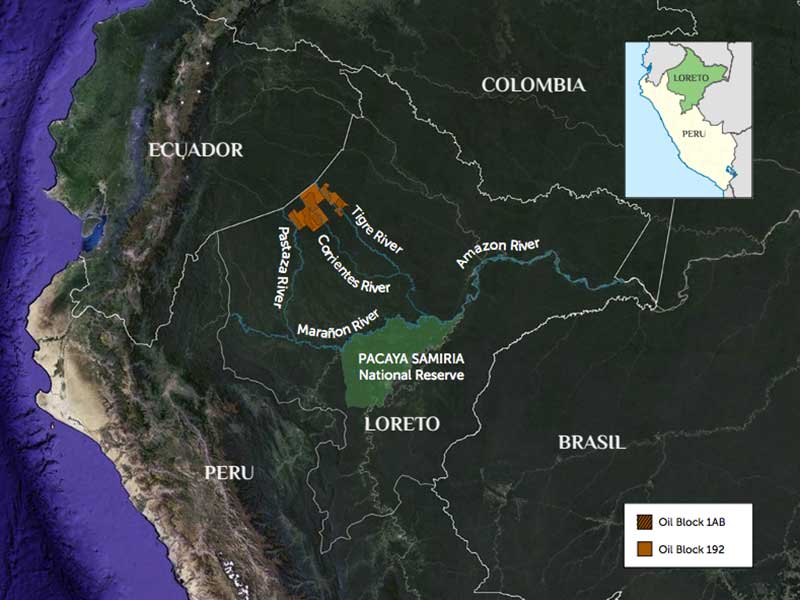
For over ten years Amazon Watch has campaigned on, published about and monitored the situation in Peru’s most important oil field known as Block 192 (formerly named Block 1AB). Back in 2007 we co-published A Legacy of Harm with EarthRights International and the Peruvian human rights group Racimos de Ungurahui, detailing the environmental impacts of Occidental Petroleum’s deliberate use of substandard technology. We have also supported indigenous delegations to ConocoPhillips shareholder meetings and were a plaintiff in the legal case against Oxy, resulting in an historic settlement for five Achuar communities. Earlier this year, the region was a central story in our blog Oil in the Peruvian Amazon: A 2015 Panorama.
After decades, the controversial oil block’s contract is coming to a close at the end of August. Whereas the block represents roughly 20% of the country’s oil output, the Peruvian government is desperately scrambling to line up a follow-on contract for another 30 years. Prospective oil companies include Pluspetrol (the current operator since Oxy left in 2000), Perenco and Pacific Rubiales. All bring with them problematic histories of human rights and environmental abuses from around the Andean-Amazon region.
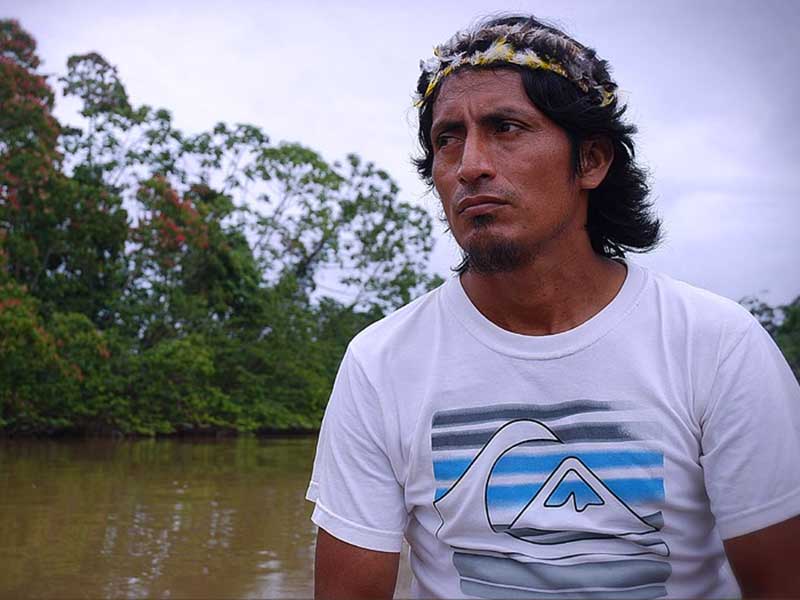
Multi-year campaigns led by the Achuar, Quechua and Kichwa indigenous peoples affected by Block 192 are coming to a crescendo. They are each leveraging this unique moment to press a series of basic demands they have been articulating reiteratively for years. These claims include land titling, remediation of poisoned land and water, compensation for use of their lands, reparations for past damage and a legitimate consultation process around any new contract. In many cases, they are simply insisting that the existing laws be upheld.
The repercussions of what happens in coming days and weeks will be felt far beyond the Tigre, Corrientes and Pastaza rivers – all of which have been declared “environmental emergency zones” due to pollution caused by oil operations. The ongoing discussions are being closely monitored by government ministries, the extractive sector, media, civil society and Peruvian indigenous federations as a precedent-setting process that will impact the future of oil operations in the Amazon.
Deflecting responsibility – the case of Pluspetrol
As several tracks of dialogue are being carried out between the Peruvian state and representative indigenous federations from across Block 192, intense focus is being placed on Pluspetrol. In a devastating critique, the Federation of Native Communities of the Upper Tigre River (FECONAT) recently published a report alongside the Chaikuni Institute, featuring perspectives of Kichwa community members.
As documented in the report, Pluspetrol’s crimes include deepening the environmental catastrophe left by Oxy, leaking contamination and causing dangerous health effects, fomenting social conflict and grassroots protests, and generally leaving the region in worst shape than they entered it 15 years ago, millions of dollars in oil profits notwithstanding. It’s not hard to sympathise with the Kichwa, who have insisted that the Peruvian government exclude Pluspetrol from consideration for future operation in the region.
The words of humble Kichwa community members expose the arrogance and bad faith which with Pluspetrol has operated in their territories. Bella, 27 years old, is quoted in the report as saying, “I’ve seen a publicity campaign saying that Pluspetrol is working hand-in-hand with the communities, that they protect the environment, our health, our children. It makes me ashamed for them to see this advertising they aren’t living up to. They don’t care. What’s more, they won’t admit all the bad things they have done. The people who don’t live here might believe the campaign, but the people from the communities don’t believe it because they live here.”
As if to reinforce the new FECONAT / Chaikuni Institute report, almost simultaneously Peruvian investigative journalists published an explosive news exposé, accusing the government of sitting on and eventually archiving over a thousand reports of environmental destruction caused by extractive companies. By allowing the period for taking action to expire, the government guaranteed impunity for many environmental crimes.
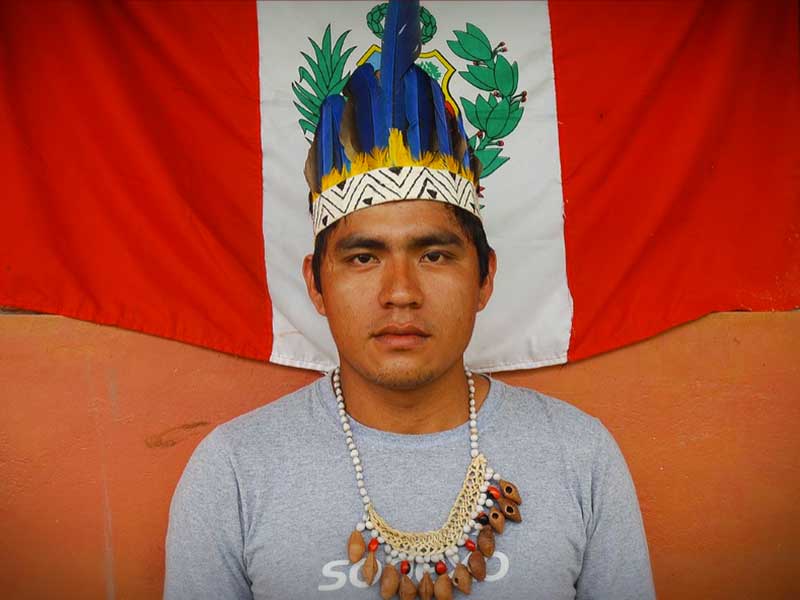
And the company which benefitted the most from this de-facto environmental cover-up? Pluspetrol. Of 13 reported environmental infractions from northern Peru, 11 were in relationship to Block 192. Additionally, from 2007 – 2014, Pluspetrol received almost $22 million in fines for environmental infractions. Instead of paying, they are fighting them in court.
But according to PlusPetrol, the company is never at fault. It shamelessly points a finger elsewhere—at Oxy, stating that the pollution is a function of operations before 2000 (a notion that is certainly partially true), and blaming contaminated water samples on activity of the Tungurahua Volcano up-river in Ecuador.
What comes next?
The situation in the jungle city of Iquitos (where the dialogues have been happening) is fluid, and any update we write may well be obsolete within several days. To date the so-called “prior consultation” has had two tracks: One involving the federations FEDIQUEP (Quechua people from the Pastaza River) and FECONACO (Achuar people from the Corrientes River), and another involving FECONAT (Kichwa people from the Tigre River).
One reason we place “prior consultation” between quotations is that the government has been pushing a parallel auction process for Block 192 with the three prospective companies. Their calendar originally included a July 13th deadline for oil corporations to submit bids for the block and a July 15th date for announcing which company would be the next operator. We were exasperated that this was planned to happen before “consultations” were slated to wrap up with indigenous federations. The licitation process has been pushed back at least several weeks now, ostensibly because the companies needed more time to make their economic assessments about the block.
FEDIQUEP & FECONACO postponed their respective consultation process last week when the government offered inadequate responses to the two indigenous federations’ demands. Talks are scheduled to resume on August 14th, but in Lima (one presumes with higher level government functionaries). It is unknown what implication this three week delay will have on the aforementioned licitation process with the corporations.
FECONAT, for its part, has been in another dialogue process in Iquitos. They have had initial conversations with the government representatives and are scheduled to continue as of August 3rd. For a sense of the process, see two recently released videos by The Condor & The Eagle film team: “Kichwa of the Tigre River – On the way to the Consulta Previa” and “Amnesty for the Kichwa People of the River Tigre.”



